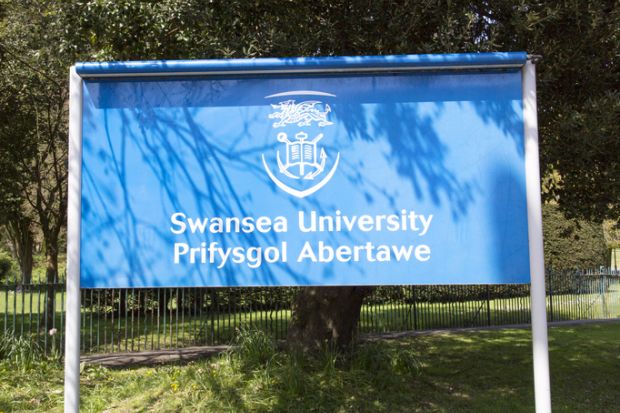The whistleblowing registrar at the centre of the scandal that led to the dismissal of Swansea University’s vice-chancellor has described being targeted by a harassment campaign in which he was called a “psychopath” and blamed for the death of a colleague.
Andrew Rhodes said that the attacks he had faced demonstrated “why people don’t whistleblow” and that, if he had known before about how events were to unfold, he “would bloody leave straight away”.
Mr Rhodes, a former senior civil servant, joined Swansea in April 2018. Seven months later, Richard Davies, the institution’s vice-chancellor, was suspended, alongside Marc Clement, dean of its management school, and two other members of staff.
Professor Davies and Professor Clement, who deny wrongdoing, were dismissed in July on the grounds of gross misconduct. Steve Poole, head of innovation, commercial and business at the School of Management, was dismissed in August, while the fourth member of staff resigned earlier this year.
The investigation is now in the hands of South Wales Police, which raided eight addresses in July as part of a probe into alleged bribery at the university, centring on the tendering process for the development the £200 million Llanelli Wellbeing and Life Sciences Village. No arrests have been made.
Mr Rhodes’ involvement in the case was thrust into the public eye in January when Professor Davies accused him of trying to “seize the position of vice-chancellor” and of breaking university rules by ordering the suspension.
Speaking at the annual conference of the Council for Advancement and Support of Education in Birmingham, Mr Rhodes said that this had been followed by the sending of anonymous emails to journalists, politicians and university stakeholders, which were “deliberately designed to tear me down”, and trolling on social media.
He said he had been “likened to Andreas Lubitz, the Germanwings pilot who flew an aircraft into a mountain having locked himself in the cockpit”, told he “was responsible for the death of a colleague”, “accused of destroying the university” and “called a psychopath”.
He said he was accused of “exacting a 20-year-old vengeance for a failed PhD, which I never took”, of “seizing power and orchestrating a set of events in order to make myself vice-chancellor” and of “making it all up”.
“They were coming every day at one point, making all sorts of allegations,” Mr Rhodes said. “A lot of them were directed at me personally; I had made myself a lightning rod, I was the one running the process, I was the one who had instigated this, so that was to be expected.”
He said that he was adamant that he had done the right thing.
“This experience is why people don’t whistleblow. If I had looked the other way I believe the university would have been exposed to severe harm,” Mr Rhodes said.
“I think it is incumbent on people to do the right thing, even when it’s very difficult.”
Mr Rhodes described steps that Swansea had taken to manage the crisis, including handing the running of the investigation and disciplinary process to outsiders, and being “candid” with key funders, regulators and stakeholders.
These included former US presidential candidate Hillary Clinton, who has lent her name to Swansea’s law school. “She has got a hell of a lot of experience of people making allegations that don’t stack up, so she was really quite understanding,” Mr Rhodes said.
He told the conference that the university, now led by former University of Leicester vice-chancellor Paul Boyle, was “stronger than it was going in” to the crisis.
Nonetheless, when people sometimes asked him what he would do differently, he said that he tells them: “I would bloody leave straight away.”
Register to continue
Why register?
- Registration is free and only takes a moment
- Once registered, you can read 3 articles a month
- Sign up for our newsletter
Subscribe
Or subscribe for unlimited access to:
- Unlimited access to news, views, insights & reviews
- Digital editions
- Digital access to THE’s university and college rankings analysis
Already registered or a current subscriber? Login







